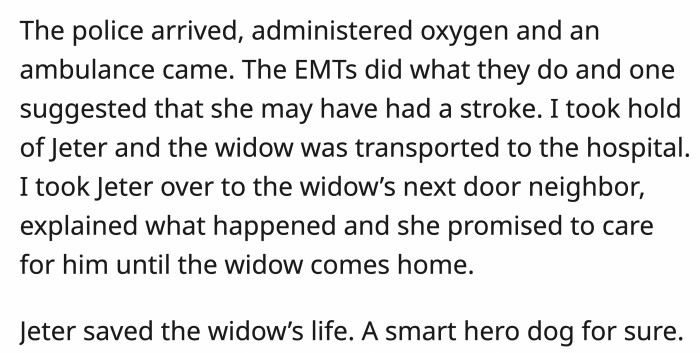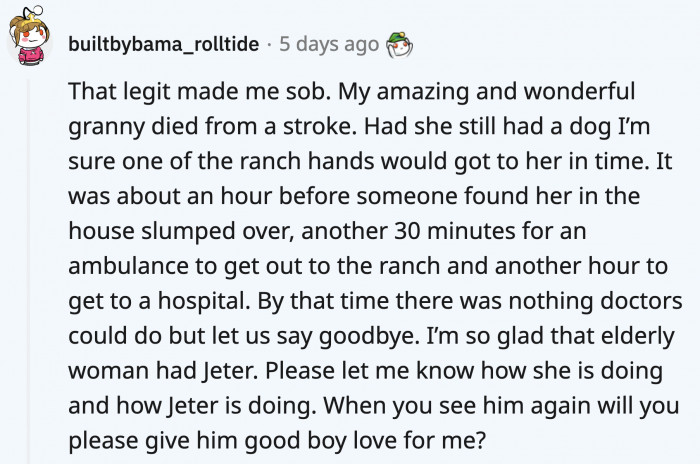Tiny Rescue Dog Alerts The Neighbor And Saves His 73-Year-Old Owner When She Had A Stroke
Dogs, cats, and other pets affect our lives in more ways than we anticipate. A 73-year-old certainly didn't know her small rescue dog would eventually save her life.
Her neighbor shared the story of the elderly woman and her tiny mixed-breed dog named Jeter. The elderly lady rescued Jeter for companionship.
The dog was named after the legendary New York Yankee, Derek Jeter. The lady opted to keep the name given by Jeter's previous owners.
The duo walks past OP's house several times a day, and occasionally another neighbor walks Jeter for the old lady. OP knows it's Jeter because he is one of those dogs who has a bouncy, happy walk.
On that particular morning, OP was sitting in her kitchen skimming through grocery store circulars when she heard whining and scratching coming from her door. She opened the door, and it was Jeter.
OP bent down to get his leash, but the dog backed away, turned around, and yelped. That's when OP noticed her elderly neighbor lying on the sidewalk.
She immediately went to check on her neighbor, who was out cold. OP checked her pulse and saw that Jeter's owner was still breathing.
OP rushed back to her house to get her phone and call 911. She went back to the old lady, sat her up, and held her as well as Jeter's leash.
Jeter was licking the old lady's hands. OP's neighbor is conscious now, but she was mumbling unintelligible words.
The police arrived and administered oxygen. They were soon followed by the EMTs, who provided the necessary first aid.
One of the EMTs suggested that the old lady may have suffered a stroke. Had it not been for Jeter's alertness, she would have been in worse shape.
OP brought the dog to their neighbor who walks him. OP explained what had happened, and the neighbor promised to look after Jeter until the older lady came home.



The Bond Between Humans and Pets
The story of Jeter, the rescue dog, highlights a significant aspect of human-animal relationships that has been extensively studied in psychology. According to research published in the journal Anthrozoös, the bond between humans and their pets can enhance emotional well-being, reduce feelings of loneliness, and even lower stress levels. This bond is particularly impactful for older adults, who may experience social isolation and loneliness. In fact, studies show that pet ownership can lead to increased levels of oxytocin—often referred to as the 'love hormone'—in both pets and their owners, fostering a sense of connection and security.
Moreover, the companionship provided by pets like Jeter can significantly improve the mental health of elderly individuals, as they often face unique challenges such as loss and mobility issues. This emotional support can be crucial in times of crisis, as illustrated in this remarkable rescue story.


A commenter shared their own story about their grandma, who unfortunately died from a stroke. If the grandma still had her dog, she would have received help much faster.

Research psychologists highlight the significant psychological benefits of pet ownership, particularly for vulnerable groups like the elderly. Dr. Ramani Durvasula, a clinical psychologist, states, "Pets can provide a unique source of companionship and emotional support, which is crucial for older adults who may face loneliness." This emotional connection can be vital, as loneliness is linked to serious health issues such as depression and cognitive decline. In Jeter's case, the bond with his owner not only offered companionship but also likely played a crucial role in prompting him to alert the neighbor during a critical health crisis. As a practical recommendation, families with elderly members should consider facilitating pet ownership or introducing therapy animals to enhance mental well-being and improve the quality of life for seniors. For more insights, visit Dr. Ramani Durvasula's website.
Jeter and OP's immediate response most likely saved the elderly lady's life

Someone pointed out that while OP helped, you shouldn't move a person (especially at that age) after they've fallen.

A redditor pointed out that OP had to move the lady to make sure she was breathing.

The Role of Dogs in Emergency Situations
Dogs are not just companions; they often serve as vital partners in emergency situations due to their keen instincts and ability to recognize human emotions. Research has shown that dogs can detect changes in human behavior and physiological responses, such as changes in heart rate or stress levels, allowing them to respond appropriately in emergencies (McGreevy, P. D., & Boakes, R. A. 2002). This instinctive behavior may have played a role in Jeter's alertness during his owner's stroke.
Moreover, a study published in the journal Applied Animal Behaviour Science indicates that dogs can be trained to recognize specific medical emergencies, enhancing their effectiveness as service animals. This suggests that while Jeter’s instincts were crucial, further training could also enhance the capacity of pets to respond in life-threatening situations. Owners can increase their dogs’ capabilities by enrolling them in training programs that teach essential alerting behaviors, thus potentially saving lives.
OP did mention that she knew not to move the older lady, but she was turning blue, and OP had to make sure she was breathing until the paramedics arrived.

We agree wholeheartedly that dogs are amazing! Jeter is just one of the many dogs to prove that!

We do hope for a full and speedy recovery for Jeter's person so they can continue their wonderful friendship.

This heartwarming story illustrates a fundamental psychological principle known as the 'attachment theory,' which posits that close relationships, whether with humans or animals, foster emotional security and resilience. Dr. John Bowlby, the pioneer of attachment theory, emphasized that secure attachments in early life lead to healthier relationships and coping strategies in adulthood. The elderly woman’s bond with Jeter likely provided her with a sense of safety and emotional support, which is crucial for mental health as one ages.
For those interested in strengthening their own emotional connections, psychologists recommend engaging in activities that promote bonding, such as regular walks and playtime with pets. These shared experiences can enhance the relationship and create a more profound sense of security, which is particularly beneficial for those who may face health challenges.
Dogs are hyper-aware of their owners, aren't they? They pay attention to our state and check on us if we're okay.

OP did such a great job listening to Jeter, and because of that, they saved his human together.

This person is obviously not a Yankees fan, but he is definitely a Jeter fan!

The Impact of Social Support on Health
The situation surrounding Jeter and his owner emphasizes the importance of social support systems in health outcomes, particularly among older adults. Research published in Health Psychology indicates that individuals with robust social support networks tend to have better health outcomes, including lower rates of chronic disease and improved recovery from illnesses. The quick response of the neighbor in this situation underscores the role that community plays in individual health crises.
To foster a supportive environment, families and communities can establish regular check-ins with older adults, encouraging neighbors to look out for one another. Implementing community programs that encourage social engagement can also help reduce isolation and promote a culture of care, ensuring that individuals like the elderly woman in this story have the support they need in times of crisis.
Unfortunately, OP deleted her account, and we have no update on how the elderly neighbor is doing. We are full of hope that she recovered and is home with Jeter right now.
How amazing is this story? Jeter's alertness and loyalty to his person saved her life, and because of that, they will have more opportunities to take happy, bouncy walks!
Psychological Analysis
This heartwarming story showcases the profound impact pets can have on our lives, particularly for older adults who may face isolation. Jeter's instinct to alert the neighbor reflects a strong emotional bond, which not only offers companionship but also serves as a protective factor during crises. The quick response from the community underscores the importance of social support in enhancing health outcomes, reminding us that connections—whether with animals or people—are vital for our well-being.
Analysis generated by AI
This touching story of Jeter highlights not only the remarkable bond between humans and their pets but also the critical role that social support systems play in our health and well-being. Trauma specialists confirm that emotional connections, whether with pets or people, can mitigate feelings of loneliness and provide essential support during health crises. As noted in numerous psychological studies, fostering these relationships and enhancing community support are key to improving health outcomes and promoting resilience. With appropriate interventions, such as encouraging pet ownership and community engagement, we can create environments where individuals feel safe, supported, and empowered to thrive.



